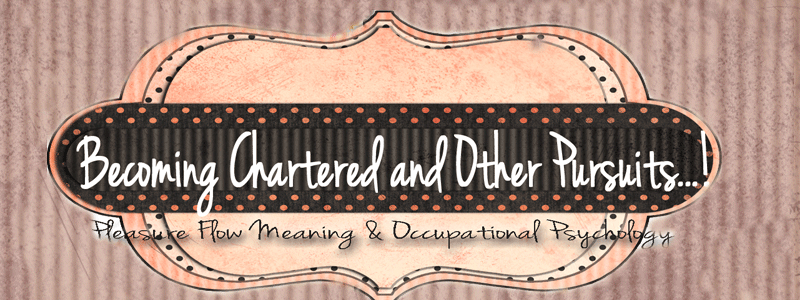Occupational Psychology simple
put is the use of psychology in the workplace or in more general terms, in an
organisation, because technically it could be either paid or unpaid work.
A more polished definition “is
the application of psychology within work and business settings” (for a more
comprehensive and insightful definition see the BPS link). However way you put it,
it’s to do with psychology and work/business. Think “occupation” and “Psychology”
and it’s quite straightforward - it makes sense now right? Somehow though I find
myself having to explain it over and over and over again (sometimes to the same
people… like really dad? It’s the same thing I’ve been going on about for years
now! ) my standard answer? “it’s like HR/Human Resources but a little more dynamic
- in my opinion. As soon as you mention HR everyone seems to get it! Ohh! They say….!
Occupational psychology and HR
are not exactly the same but they overlap a little, just a tiny bit. They both cover
similar areas such as recruitment and assessment, training, performance
management etc except of course occupational psychology goes a lot further and
includes work environments, ergonomic, human-machine interaction, test publishing/psychometrics
etc - for a complete list of the 8 areas of occupational psychology see the prospect
link below. It’s an applied psychology so basically anywhere you have groups of
people (ie. 2 or more) it is applicable in one form or another.
I became interested in the
occupational part of psychology whist studying Business and Psychology at university.
I guess you could argue that by deciding to combine the two subjects (business
and psychology) in the first place I must have been leaning that way already anyway.
Perhaps, it’s possible, all I know is that all those years ago when I started
university I wasn’t thinking about becoming an occupational psychologist but somewhere
along the line the penny dropped and I knew this was what I wanted to do. I guess
I just needed more information about the field to whet my appetite and confirm
my interest. Unfortunately for me by the time I was sure I wanted to become an
occupational psychologist I realised my combined degree was not accredited and so
I had to do another year to top up my psychology half.
The chartership process in a
nutshell
Registered Occupational Psychologist
|
Chartership (Qualification in Occupational
Psychology Stage 2) to be Full Division Member
|
British Psychological Society accredited MSc Occupational Psychology
|
British Psychological Society accredited BSc or BA Psychology (i.e.
conferring Graduate Basis of Chartership
|
I am currently on the second level (from the bottom), about to start my msc.
Occupational psychology goes by
different names, especially now the line between it and HR are blurring a
little. As far as I know and I have done a lot of research on this, there is no
difference between occupational psychology and business psychology (or
organisational psychology or industrial psychology for that matter). Although I
have been told that depending on who you ask this question the answer might change
but I think this has more to do with whether people are registered with the BPS
and the BPS’s protection of certain titles.
Some links below for further
information, I especially like the prospects website, it’s just a lot more straightforward
and to the point. The Wikipedia link is aimed more for American readers but
aside for the name (they call it Industrial and Organisational Psychology) and their
regulatory body (in the UK we are regulated by the British Psychological
Society; BPS) the main info is the same.
